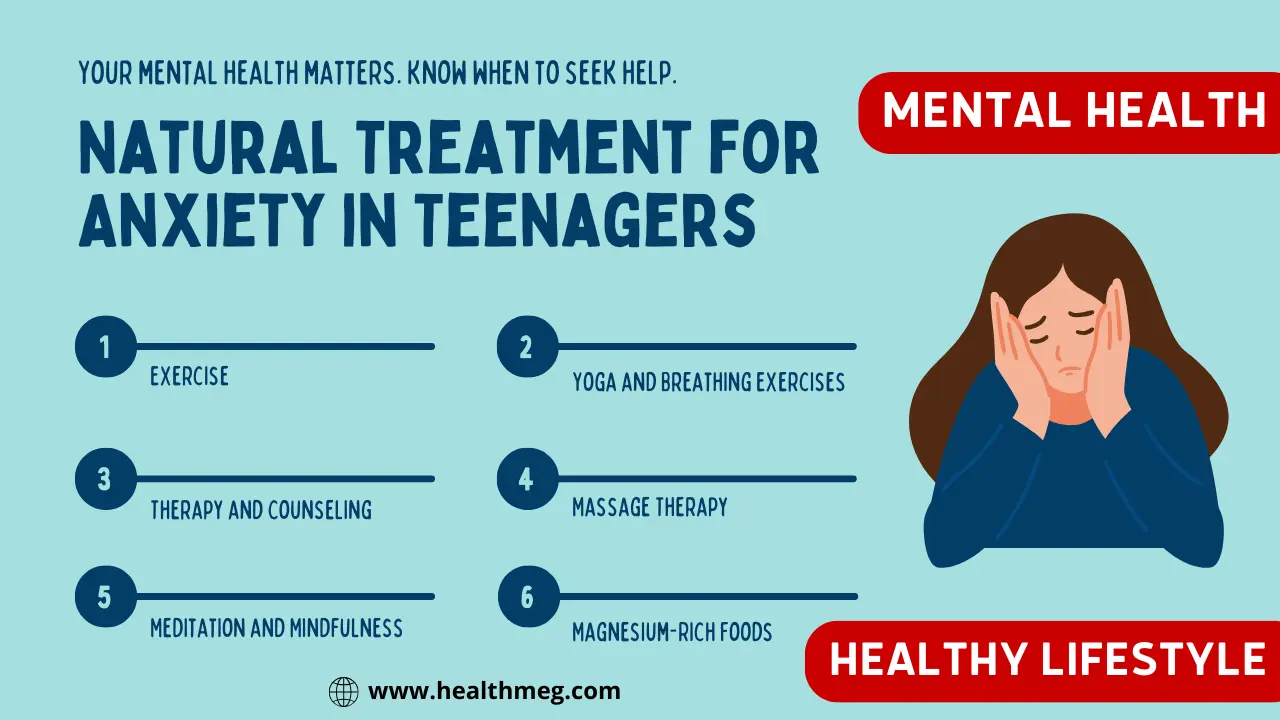Ashwagandha is an ancient medicinal herb that has become increasingly popular in recent years for its restorative and balancing effects. But if you’ve just started taking ashwagandha supplements, you may be wondering – how long does it take for ashwagandha to work?
This is a common question since ashwagandha is unique in the time it takes to reach optimal levels in your body and exert its full effects.
This thorough guide looks at the scientific studies on the chronology of ashwagandha depending on several aspects such as formulation, dose, and desired health outcomes.
Continue reading to see how realistically you may anticipate reaping the amazing benefits of ashwagandha supplementation.
Do read the People Also Ask (FAQs) about this topic.
Key Takeaways
- Ashwagandha is an adaptogenic herb that helps the body cope with stress.
- It can take 2-4 weeks to start feeling the full benefits of Ashwagandha.
- Some people may feel the effects sooner, while others may take longer.
- It is important to be consistent with taking Ashwagandha to see the best results.
Here is a bonus key takeaway:
- Ashwagandha is generally safe for most people to take, but it is important to talk to your doctor before taking it, especially if you have any underlying health conditions or are taking any medications.
Understanding Ashwagandha
What Is Ashwagandha?
Ashwagandha (Withania somnifera) is a medicinal herb that has been used in India’s Ayurvedic medicine tradition for over 3,000 years. The name itself means “smell of horse” in Sanskrit, referring to the herb’s unique scent and ability to increase strength. It is Commonly referred to as “Indian ginseng” or “winter cherry”.
Benefits of Using Ashwagandha
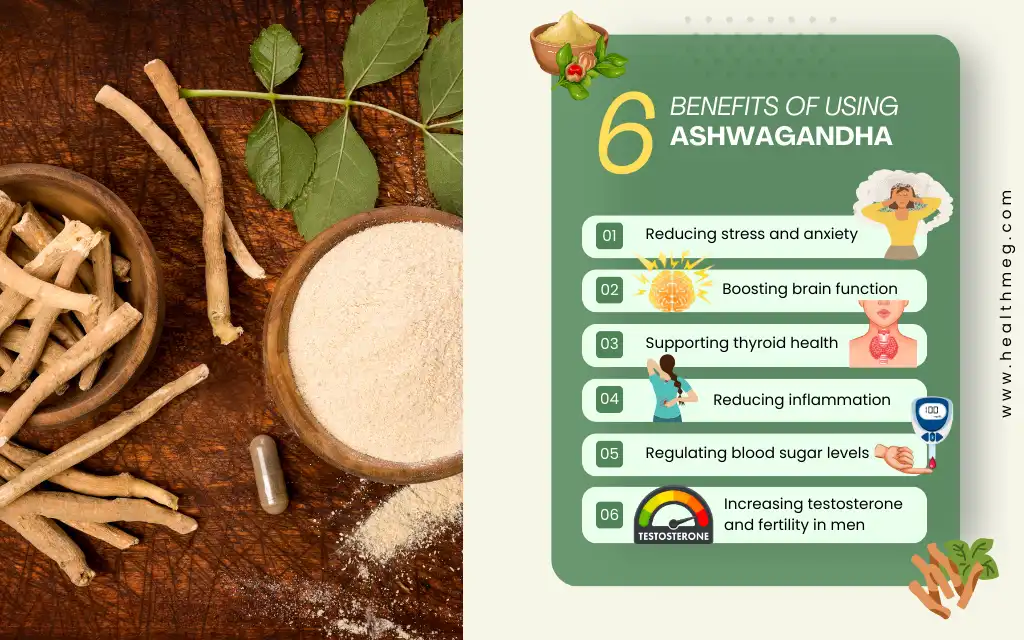
Some of the main uses and benefits of ashwagandha include:
- Reducing stress and anxiety – Ashwagandha is probably best known for its adaptogenic properties. Adaptogens help your body adapt to stress and balance hormone levels.
- Boosting brain function – Compounds in ashwagandha, like with anolides and alkaloids, have been shown to enhance memory, focus, and cognitive performance.
- Increasing testosterone and fertility in men – Research shows ashwagandha can boost testosterone levels, sperm quality, and reproductive health in men.
- Supporting thyroid health – Ashwagandha has thyroid-modulating effects and helps manage hyper- or hypothyroidism.
- Reducing inflammation – The herbs exert powerful anti-inflammatory effects comparable to medications.
- Regulating blood sugar levels – Ashwagandha increases insulin secretion and improves insulin sensitivity.
These wide-ranging benefits are attributed to the various bioactive compounds found in ashwagandha, including withanolides, alkaloids, fatty acids, amino acids, and a variety of antioxidants.
But have you ever wondered how long it takes for your body to start experiencing these benefits once you begin taking ashwagandha? Let’s discuss this below.
The Active Compounds in Ashwagandha
The main bioactive components that have been extensively studied are a group of compounds called withanolides. These steroidal lactones are present in high concentrations in ashwagandha and appear to be responsible for its most prominent benefits.
In particular, withanolides like withaferin A and withanolide D have demonstrated potent effects:
- Binding to GABA receptors in the brain produces a calming effect similar to anti-anxiety medications that target GABA neurotransmission. This produces an anxiolytic effect similar to prescription benzodiazepines and antidepressant medications.
- Modulating cortisol levels via effects on the hypothalamic-pituitary-adrenal (HPA) axis, helps regulate the body’s stress response. These effects modulate the production of hormones related to stress, reproduction, and thyroid function.
- Exerting neuroprotective activity helps alleviate depression and improve cognition and memory formation.
- It possesses immunomodulatory properties including natural killer cell enhancement and broad anti-inflammatory effects. This enhances the body’s defence against pathogens and cellular dysfunction.
- In addition to withanolides, ashwagandha contains other beneficial compounds like alkaloids, saponins, iron, amino acids, flavonoids and antioxidants that broaden its bioactivity throughout the body.
This complex combination of phytochemicals gives ashwagandha its adaptogenic, neuroprotective, immunomodulatory, and hormonal balancing effects.
But it also explains why it takes some time for optimal levels of these compounds to build up enough in your system to feel the full, sustained benefits of ashwagandha supplementation.
Mechanisms of Action: How Ashwagandha Works in the Body and Brain

Based on considerable research, scientists have identified some of the main mechanisms behind ashwagandha’s effects:
- Hypothalamic-pituitary-adrenal (HPA) axis modulation – Ashwagandha helps regulate cortisol, DHEA and other hormones involved in the body’s stress response via action on the HPA axis and adrenal glands. This leads to anti-stress and anti-anxiety effects.
- GABAergic signalling – Compounds in ashwagandha bind to GABA receptors in the brain similarly to benzodiazepines and other anti-anxiety meds. This promotes relaxation, reduced anxiety and better sleep.
- Anti-inflammatory activity – Ashwagandha exhibits natural COX-2 enzyme inhibition comparable to anti-inflammatory drugs. It also reduces pro-inflammatory cytokines involved in pain and swelling.
- Antioxidant effects – Ashwagandha boosts the body’s natural antioxidant defenses including superoxide dismutase and catalase. This protects against oxidative damage and supports cellular health.
- Increased nitric oxide production – Ashwagandha helps boost nitric oxide levels, which causes vasodilation and enhances blood flow, endurance and vitality.
- Thyroid modulation – Active compounds in ashwagandha influence thyroid stimulating hormone (TSH), triiodothyronine (T3) and thyroxine (T4) levels, helping maintain healthy thyroid function.
- Neuroprotective activity – Ashwagandha promotes neuron growth in key areas of the brain involved with memory and cognitive function and protects against plaque buildup.
These mechanisms help produce ashwagandha’s diverse range of physical and psychological benefits throughout the entire body. But how long does it take for these effects to manifest once you start taking ashwagandha?
Factors That Influence How Long Does it Take for Ashwagandha to Work
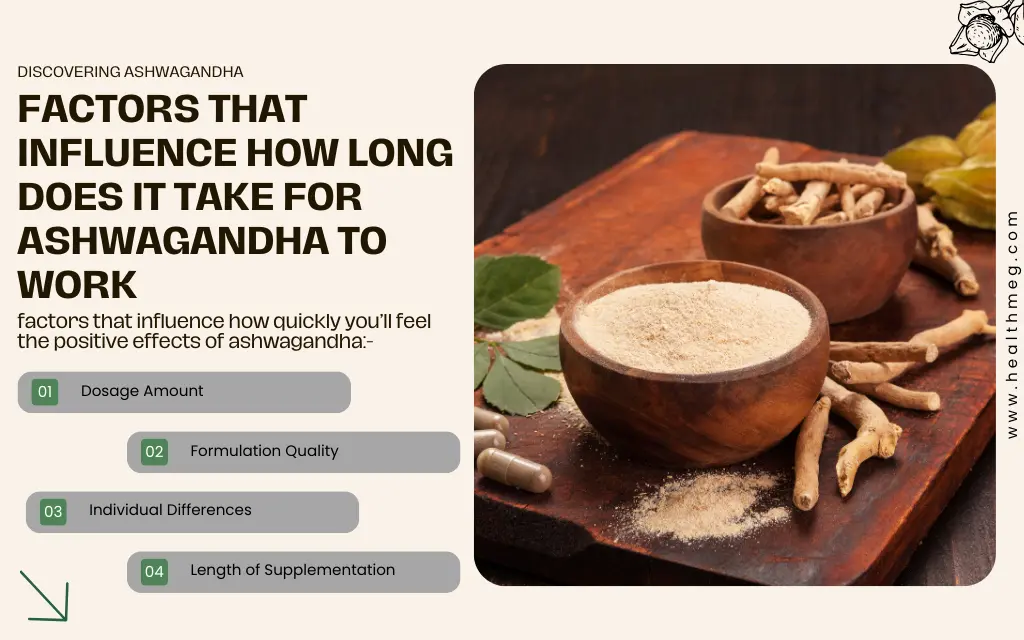
Several factors influence how quickly you’ll feel the positive effects of ashwagandha:
1. Dosage Amount
Some research indicates that taking higher dosages of ashwagandha leads to faster results. Most studies demonstrating effects use dosages between 300-500mg of standardized extracts taken 1-2 times per day.
The more ashwagandha you take, the faster sufficient levels of the active withanolides will build up. However, dosage recommendations vary depending on the targeted benefits.
For reference, dosages up to 1000mg daily are generally considered safe, with the most common dosage being 300-500mg once or twice daily.
2. Formulation Quality
The preparation method used to extract and concentrate ashwagandha’s key compounds also plays a role. High-concentration standardized extracts optimized for certain withanolides tend to produce better results compared to raw ashwagandha powder.
Look for supplements made with at least 5% withanolides or a branded extract like KSM-66® or Sensoril® for best absorption and efficacy.
3. Individual Differences
Factors like your age, metabolism, underlying health conditions, and medications can affect how quickly ashwagandha takes effect.
For example, older adults or those with hypothyroidism may require longer supplementation to experience benefits compared to healthy young individuals with fast metabolisms. Certain medications and herbs may also interact.
Genetic differences in metabolizing compounds and variability in absorption rates can cause some individuals to feel effects faster than others as well.
4. Length of Supplementation
Some benefits happen quickly, while others require longer-term supplementation for the herb to exert its full therapeutic effect.
Ashwagandha’s anxiety-lowering effects may happen within days or weeks of use. However, benefits like improved reproductive health in men, thyroid support, and reduced inflammation are seen after months of continued use.
Therefore, the length of time you’ve been consistently taking ashwagandha influences how soon you’ll experience any given benefit.
Timeline of Effects Reported in Scientific Research
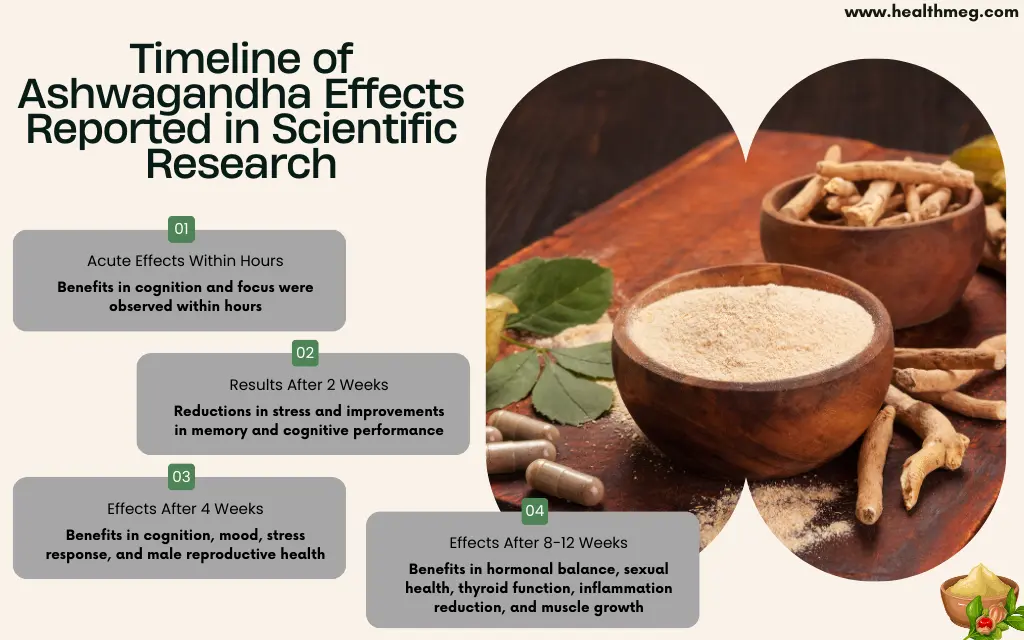
Now that we’ve covered the factors involved, what does the research say about how long does it take for Ashwagandha to work for different goals?
Here’s a look at the results from clinical studies investigating the timeline of ashwagandha benefits:
Acute Effects Within Hours
In studies analyzing the acute, single-dose effects of ashwagandha, some benefits in cognition and focus were observed within hours:
- A dosage of 500mg of ashwagandha root extract improved reaction time, task performance, and attention in healthy adults within 2 hours. Effects peaked at 5 hours.
- Immediate memory and cognitive performance increased within 2 hours of taking 300mg ashwagandha extract in healthy young adults.
- A single dose of 500mg ashwagandha extract significantly reduced levels of the stress hormone cortisol within 60 minutes in chronically stressed adults.
So while ashwagandha works best with sustained long-term use, these studies show certain effects may kick in within the first few hours when taking larger single doses.
Results After 2 Weeks
Some of the ashwagandha’s most rapid effects are seen within just a few weeks of daily usage, particularly related to reductions in stress and improvements in memory and cognitive performance:
- In a 2 week study on 50 adults, 300mg ashwagandha extract improved immediate and general memory, executive function, sustained attention, and information processing speed.
- Taking 300mg ashwagandha root extract for 2 weeks significantly reduced serum cortisol levels in chronically stressed adults, with benefits occurring within just 3 days.
- Healthy men who took 500mg/day of standardized leaf extract for 2 weeks demonstrated enhanced psychomotor performance and faster reaction times in cognitive assessments.
So while ashwagandha’s effects build gradually over 4-8 weeks, studies demonstrate noticeable improvements in cognitive abilities and mood within 1-2 weeks.
Effects After 4 Weeks
By 4 weeks, ashwagandha’s benefits on cognition, mood, stress response, and male reproductive health kick in more fully:
- In men with fertility issues, 300mg ashwagandha taken daily for 4 weeks increased sperm concentration by 167% and sperm motility by 53%.
- Adults with mild cognitive impairment experienced improved memory, executive function, attention and mental fatigue after taking 300mg of KSM-66 ashwagandha extract for 4 weeks.
- In a study on 250 adults with chronic stress, 300mg daily of high-concentration ashwagandha extract for 4 weeks lowered morning cortisol by 24% and self-reported anxiety scores by 44%.
- Healthy men taking 5g per day of ashwagandha root powder for 4 weeks saw significant increases in sperm quality and motility, with benefits continuing to improve over 12 weeks.
So ashwagandha’s positive effects on the body and mind appear to ramp up considerably by the 4-week mark as active compounds accumulate and exert their benefits throughout the nervous system.
Overall, research shows major improvements in these areas are seen in as little as 4 weeks of daily ashwagandha use.
Effects After 8-12 Weeks
After 2-3 months of steady ashwagandha supplementation, more pronounced benefits in hormonal balance, sexual health, thyroid function, inflammation reduction, and muscle growth are seen:
- 120 healthy men taking 675mg/day ashwagandha extract for 12 weeks experienced boosts in testosterone levels, muscle strength, exercise endurance, and fat loss compared to placebo.
- Adults with an underactive thyroid (hypothyroidism) taking 300mg of ashwagandha extract twice daily for 8 weeks showed improved thyroid levels (T4 and TSH) and reduced thyroid gland size.
- In a 60-day study in healthy adults, 300mg/day ashwagandha extract enhanced cardiorespiratory endurance and quality of life while lowering inflammation markers like C-reactive protein.
- In infertile men, taking 5g per day of ashwagandha powder for 3 months increased sperm count and motility by 167% and 53% respectively, with effects continuing to improve over 6 months.
So for goals like balancing hormones, improving sexual vitality, reducing inflammation and increasing fitness, ashwagandha’s benefits are much more apparent after using it consistently for 2-3 months.
Sustained Effects With Long-Term Use
Research shows continued supplementation for 6 months to 1 year produces sustained improvements in areas like reproductive health, thyroid function, mental acuity, and more:
- In men with fertility problems, taking 675mg/day of ashwagandha for 1 year improved sperm quality, volume, and motility while boosting serum testosterone by 10-22%.
- Adults with bipolar disorder taking 500mg/day of ashwagandha extract for 24 weeks experienced sustained improvements in memory, executive function, and attention versus the placebo group.
- Healthy men taking 300mg/day of ashwagandha root extract for 1 year exhibited enhanced cardiorespiratory endurance and reduced LDL and triglycerides compared to placebo.
So while ashwagandha produces valuable effects in the short-term, even better results are seen with steady long-term intake for 6 months to 1 year or longer.
For continued benefits in the areas discussed, daily ashwagandha supplementation on an ongoing, long-term basis provides the best results.
Studies showing benefits extending 6 months to 1 year with sustained use indicate ashwagandha is safe and effective when taken for long periods.
However, cycling ashwagandha by taking breaks every few months may help maintain efficacy for some individuals. As with any supplement, periodic cycling is advisable.
How Long Does It Take for Ashwagandha to Work for Different Goals?
Based on the extensive research, here are the typical timeframes you can expect to see benefits from ashwagandha based on your goals:
- For reducing stress and anxiety, most studies show significant improvements within 2-4 weeks. Mild calming effects may be noticed within 1 week.
- For memory, focus and cognitive enhancement, benefits like improved information processing and reaction time occur as soon as 1-2 weeks, with continuing increases over 4-6 weeks.
- For lowering inflammation markers like CRP and boosting arthritis symptoms, allow 6-8 weeks for substantial anti-inflammatory activity, with the full pain-relieving effects taking 8-12 weeks.
- For increasing testosterone and improving sexual health in men, allow 6-8 weeks for moderate boosts in T levels, sperm quality and libido, and 8-12 weeks for maximal benefits.
- For thyroid support and balancing T3, T4, and TSH levels, 8-12 weeks of daily use appears optimal based on clinical evidence.
- For reducing blood sugar and increasing insulin sensitivity, modest improvements begin within 4 weeks but 8-12 weeks is ideal for seeing major enhancements in blood markers.
- For building muscle, strength and endurance, increased energy and stamina may occur within 3-4 weeks but wait 8+ weeks to experience peak performance and workout benefits.
In summary, while some benefits may appear quickly, ashwagandha works best when taken regularly over 2-3 months to reach full therapeutic potential. The longer you take it, the greater the results you’ll see!
Tips to Maximize Ashwagandha’s Benefits
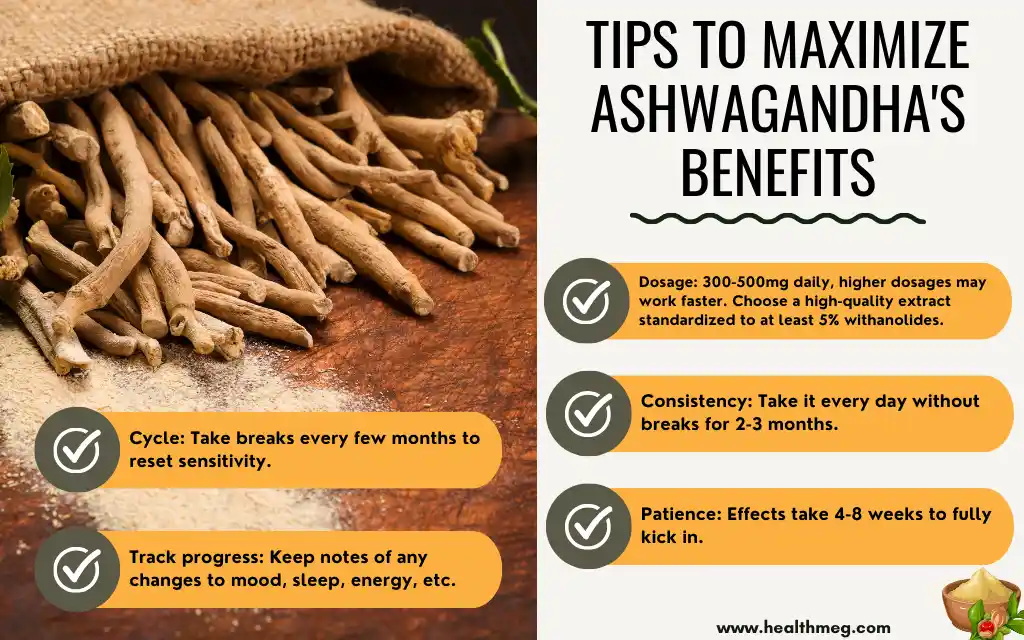
Follow these tips to get the maximum effects from your ashwagandha supplementation regimen:
- Take an adequate dosage based on your needs and goals. Most research uses dosages of 300-500mg daily. Higher dosages may work faster.
- Look for a high-quality extract standardized to at least 5% withanolides. KSM-66 and Sensoril are evidence-backed. Raw powders are less reliable.
- Take it consistently every day without breaks for 2-3 months to feel the full, sustained benefits.
- Be patient and stick with it – effects take 4-8 weeks to fully kick in. Trust the process.
- Cycle occasionally by taking breaks every few months to reset sensitivity, then continue supplementation.
- Track progress by keeping notes of any changes to mood, sleep, energy, etc.
Using ashwagandha smartly will get you results faster and help you experience the full breadth of benefits.
Conclusion: What Results to Realistically Expect from Ashwagandha
Based on a look at dozens of studies and an analysis of the active compounds and mechanisms involved, here is a realistic overview of ashwagandha’s timeline:
- Mild improvements in focus, anxiety and sleep may occur in the first 1-2 weeks.
- By weeks 4-6, significant reductions in stress, improved cognitive abilities, enhanced fertility and increased antioxidant activity will manifest.
- After 2-3 months (8-12 weeks) of continued use, major improvements in testosterone, thyroid function, blood sugar regulation, inflammation, endurance and muscle gain are expected.
- Taking ashwagandha long-term for 6 months to 1 year (or longer) produces the most substantial and sustained results for vitality, sexual health, mental acuity and overall well-being.
While ashwagandha certainly offers some rapid benefits, allowing at least 2 months for full effects is ideal. The payoff for your patience will be experiencing the herb’s remarkable healing and restorative powers.
Hopefully, this comprehensive guide has provided clarity on the realistic timelines you can expect to see results from smart ashwagandha supplementation based on the incredible clinical evidence behind this ancient Ayurvedic herb.
People Also Ask (FAQs)
Q) How long does it take for Ashwagandha to work?
A) The time it takes for Ashwagandha to work varies from person to person. Some may experience its effects within a week, while others may require a few weeks of consistent use. Patience is the only key when incorporating ashwagandha into your routine. Consulting a professional doctor can provide you having guidance regarding the effectiveness of ashwagandha for your specific needs.
Q) How do you know if Ashwagandha is working?
A) You can figure out if Ashwagandha is working by observing changes in your stress levels, energy, and overall sense of well-being. Improved stress management, increased vitality, a sense of calm, etc. may indicate the effectiveness of Ashwagandha. But since everyone’s reaction might be different, it’s critical to record your own experience.
Q) Does Ashwagandha work right away?
A) Ashwagandha typically doesn’t work right away; its effects may take time to manifest. Some people may notice changes within a week, while for others, it might take a few weeks of consistent use. Patience and regular consumption are often necessary to experience its full benefits.
Q) Can you feel Ashwagandha’s first day?
A) Feeling the effects of Ashwagandha on the first day is uncommon. Its impact often becomes noticeable after consistent use over some time, typically ranging from a week to several weeks. Individual responses may vary, but immediate effects are less typical.
Q) Which is better ashwagandha powder or tablet?
A) The choice between ashwagandha powder or tablets depends on personal preference. Tablets offer convenience and precise dosing, while powder allows flexibility in dosage. Both can be effective; it’s a matter of what suits your lifestyle and preferences.
References
- National Center for Complementary and Integrative Health (NCCIH)
- URL: https://www.nccih.nih.gov/
- The NCCIH is a part of the National Institutes of Health (NIH) and provides evidence-based information on various herbal supplements, including Ashwagandha.
- Mayo Clinic
- URL: https://www.mayoclinic.org/
- Mayo Clinic offers comprehensive health information and often includes articles on herbal remedies, including Ashwagandha.
- Harvard Health Publishing
- URL: https://www.health.harvard.edu/
- Harvard Health Publishing features articles and research on herbal remedies, providing valuable insights into the use of Ashwagandha.
- PubMed
- URL: https://pubmed.ncbi.nlm.nih.gov/
- PubMed is a database of scientific and medical research articles. It can be an excellent source for finding studies and clinical trials related to Ashwagandha.
- WebMD
- URL: https://www.webmd.com/
- WebMD offers health-related articles and information, including details about herbal supplements like Ashwagandha.





